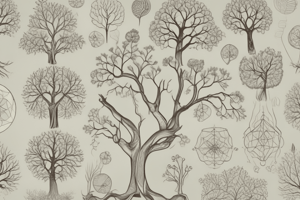Podcast
Questions and Answers
What is the primary focus of zoology?
What is the primary focus of zoology?
- The study of cellular processes (correct)
- The study of animals (correct)
- The study of plants (correct)
- The study of microorganisms (correct)
Which principle describes the maintenance of a stable internal environment in organisms?
Which principle describes the maintenance of a stable internal environment in organisms?
- Heredity
- Cell Theory
- Homeostasis (correct)
- Metabolism
What does ecology study?
What does ecology study?
- The structure of cells
- Interactions between organisms and their environment (correct)
- The variation of genetic traits
- The classification of plants
Which branch of biology focuses on heredity and genetic variation?
Which branch of biology focuses on heredity and genetic variation?
What is metabolism in the context of biology?
What is metabolism in the context of biology?
Which concept states that all living organisms are made of cells?
Which concept states that all living organisms are made of cells?
What is the difference between a population and a community in biological terms?
What is the difference between a population and a community in biological terms?
Which branch of biology studies biological molecules like DNA and proteins?
Which branch of biology studies biological molecules like DNA and proteins?
What is the primary function of photosynthesis in plants?
What is the primary function of photosynthesis in plants?
What is the role of mutation in evolution?
What is the role of mutation in evolution?
Which biological molecules are primarily responsible for energy storage?
Which biological molecules are primarily responsible for energy storage?
What is natural selection?
What is natural selection?
What is meant by the biosphere?
What is meant by the biosphere?
Which process involves the increase in size and complexity of organisms?
Which process involves the increase in size and complexity of organisms?
What is an important ethical consideration in biology?
What is an important ethical consideration in biology?
What is the primary source of energy for living organisms?
What is the primary source of energy for living organisms?
Flashcards
Biology
Biology
The study of life and living organisms.
Zoology
Zoology
The study of animals
Ecology
Ecology
Study of organisms and their environment.
Cell Theory
Cell Theory
Signup and view all the flashcards
Homeostasis
Homeostasis
Signup and view all the flashcards
Metabolism
Metabolism
Signup and view all the flashcards
Evolution
Evolution
Signup and view all the flashcards
Ecosystem
Ecosystem
Signup and view all the flashcards
Biosphere
Biosphere
Signup and view all the flashcards
Photosynthesis
Photosynthesis
Signup and view all the flashcards
Cellular Respiration
Cellular Respiration
Signup and view all the flashcards
Natural Selection
Natural Selection
Signup and view all the flashcards
Adaptation
Adaptation
Signup and view all the flashcards
Proteins
Proteins
Signup and view all the flashcards
Carbohydrates
Carbohydrates
Signup and view all the flashcards
Classification
Classification
Signup and view all the flashcards
Study Notes
Introduction to Biology
- Biology is the study of life, encompassing all living organisms and their interactions.
- It's a vast and interdisciplinary field, integrating concepts from chemistry, physics, and other sciences.
- Biology explores the structure, function, growth, origin, evolution, and distribution of living things.
Branches of Biology
- Zoology: The study of animals, covering various aspects from their anatomy and physiology to their behavior and ecology.
- Botany: The study of plants, including their structure, function, classification, and interactions with the environment.
- Microbiology: The study of microorganisms, such as bacteria, viruses, and fungi, often examining their role in health and disease.
- Ecology: The study of the interactions between organisms and their environment, encompassing populations, communities, ecosystems, and biospheres.
- Genetics: The study of heredity and the variation of inherited characteristics.
- Molecular Biology: The study of biological molecules, their structure, function, and interactions, including DNA, RNA, and proteins.
- Cell Biology: The study of cells, their structure, function, and processes, including cell division, communication, and metabolism.
- Physiology: The study of the functions of living organisms and their parts.
- Evolutionary Biology: The study of the processes that have resulted in the diversity of life on Earth.
Fundamental Principles of Biology
- Cell Theory: All living organisms are composed of cells, which are the basic units of life.
- Homeostasis: Maintaining a stable internal environment despite external changes. Organisms regulate their body temperature, pH, and other parameters to maintain optimal conditions for survival.
- Metabolism: The sum of all chemical reactions that occur in an organism, including energy production and consumption.
- Heredity: The transmission of traits from one generation to the next through genes.
- Evolution: The process by which populations of organisms change over time due to natural selection.
Biological Systems
- Organisms: Individual living entities adapted to their environment.
- Populations: Groups of organisms of the same species occupying a specific area.
- Communities: Groups of different populations interacting within a specific area.
- Ecosystems: Communities and their interacting abiotic factors (e.g., climate, soil, water).
- Biosphere: The global sum of all ecosystems, encompassing all living organisms and their physical environment.
Key Processes in Biology
- Photosynthesis: The process by which plants and other photoautotrophs convert light energy into chemical energy.
- Cellular Respiration: The process by which cells break down organic molecules to release energy in the form of ATP (adenosine triphosphate).
- Reproduction: The process by which organisms produce offspring, ensuring the continuation of their species.
- Growth and Development: The increase in size and complexity of an organism throughout its life cycle.
- Adaptation: The process through which organisms become better suited to their environment over time.
- Natural Selection: The process where individuals with advantageous traits are more likely to survive and reproduce, passing these traits to their offspring.
- Mutation: A change in the genetic material that can lead to new traits.
Biological Molecules
- Proteins: Complex molecules involved in diverse functions, including catalysis, structure, and transport.
- Carbohydrates: Organic molecules serving as a primary source of energy.
- Lipids: Fats and oils, playing roles in energy storage and cell membrane structure.
- Nucleic Acids: DNA and RNA, carrying genetic information.
Classification of Organisms
- A hierarchical system for grouping and organizing living organisms based on shared characteristics.
- Starting from broad categories (domains) to progressively narrower ones (kingdoms, phyla, classes, orders, families, genera, species).
Importance of Biology
- Understanding of biological processes crucial for improving human health, agriculture, and other fields.
- Impacts human health, disease prevention and treatment.
- Plays a role in environmental conservation by studying ecological interactions.
- Influences improvements in food production and agricultural practices.
Ethical Considerations in Biology
- Appropriate use of scientific findings in both medical and agricultural applications.
- Awareness of the implications of gene editing and genetic engineering technologies.
- Respect for the environment and conservation concerns are important considerations.
- Responsible animal use in research and ethical treatment for research subjects.
Studying That Suits You
Use AI to generate personalized quizzes and flashcards to suit your learning preferences.



